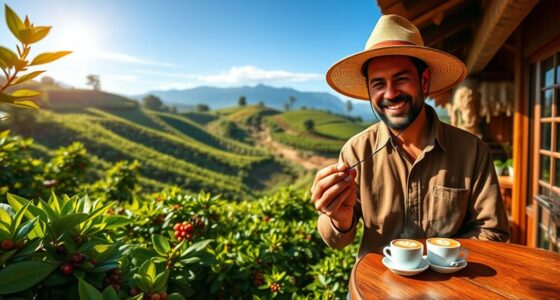As an eco-conscious coffee drinker, you can make a difference by choosing beans from sustainable farms with certifications like Fair Trade or Rainforest Alliance. Opt for biodegradable packaging and use reusable brewing tools to cut waste. Supporting local roasters and innovative industry practices also boosts environmental efforts. Staying informed enables you to make smarter choices that protect the planet. If you keep exploring, you’ll discover even more ways to enjoy coffee responsibly and sustainably.
Key Takeaways
- Choose coffee from sustainably farmed sources with certifications like Fair Trade or Rainforest Alliance.
- Opt for biodegradable packaging options to reduce plastic waste and environmental impact.
- Support reusable brewing tools and locally sourced beans to minimize waste and carbon footprint.
- Stay informed and make intentional choices that promote eco-friendly practices within the coffee industry.
- Advocate for industry innovation and sustainable practices to accelerate environmental responsibility across the sector.

Sipping your coffee with care for the planet means making mindful choices that reduce environmental impact. As an eco-conscious coffee drinker, you understand that your daily ritual can support a healthier planet. One of the most impactful steps you can take is choosing coffee sourced from sustainable farming practices. Sustainable farming ensures that coffee cultivation minimizes harm to the environment, conserves water, and maintains soil health. By selecting beans grown with environmentally friendly methods, you help promote biodiversity and prevent deforestation. Many coffee brands now prioritize certifications like Fair Trade or Rainforest Alliance, which guarantee that farms meet strict sustainability standards. Opting for these labels not only supports eco-friendly agriculture but also benefits farmers and local communities, creating a ripple effect of positive change.
Beyond the origin of your coffee, pay attention to the packaging. Conventional coffee packaging often ends up in landfills, taking years to decompose. To truly align your coffee habits with your environmental values, seek out options that use biodegradable packaging. This type of packaging breaks down naturally and quickly, reducing plastic waste and pollution. Many companies now offer biodegradable coffee bags or compostable capsules, making it easier for you to enjoy your brew while staying eco-conscious. By choosing products with biodegradable packaging, you’re actively reducing plastic pollution and supporting innovations that prioritize environmental responsibility. Supporting sustainable packaging innovations can also drive the industry toward more eco-friendly solutions.
Your choices don’t stop at the product itself; they extend to how you prepare and enjoy your coffee. For example, investing in a reusable coffee filter or a sustainable brewing device minimizes waste generated from single-use filters or pods. Also, consider supporting local roasters who source beans directly from sustainable farms, reducing the carbon footprint associated with long-distance transportation. These small actions collectively contribute to a more sustainable coffee culture, emphasizing quality and environmental care over convenience.
Being an eco-conscious coffee drinker means staying informed and making intentional decisions. The impact of your choices can be significant, encouraging brands to adopt more sustainable practices and inspiring others to follow suit. Every time you pick coffee from sustainable farms and opt for biodegradable packaging, you’re making a statement: your love for coffee is matched by your commitment to protecting the planet. It’s about integrating these mindful habits into your daily routine, turning a simple pleasure into a powerful act of environmental stewardship. With every sip, you’re supporting a more sustainable future—one cup at a time. Additionally, supporting innovative sustainable practices within the coffee industry can accelerate the adoption of eco-friendly methods across the sector.
Frequently Asked Questions
How Can I Tell if My Coffee Is Sustainably Sourced?
To tell if your coffee is sustainably sourced, look for labels indicating shade-grown coffee or fair trade practices. Shade-grown coffee supports biodiversity and reduces environmental impact, while fair trade guarantees fair wages and ethical working conditions. You can also research brands that prioritize transparency and eco-friendly certifications. By choosing these options, you support sustainable farming methods and promote a healthier planet with every cup.
Are There Certifications That Guarantee Eco-Friendly Coffee?
You wonder if certifications guarantee eco-friendly coffee, and the answer is yes. Look for Fair Trade labels, which assure fair wages and sustainable farming practices, and Organic Certification, indicating the coffee is grown without harmful chemicals. These certifications help you identify coffee that’s better for the environment and farmers. Always check the packaging to confirm the coffee carries these trusted marks before making your eco-friendly choice.
What Are the Environmental Impacts of Coffee Production?
You might wonder about the environmental impacts of coffee production. It considerably affects water usage, often requiring large amounts of water for cultivation, and pesticide impact, which can harm ecosystems and biodiversity. Pesticides used in some farms may contaminate local water supplies and affect wildlife. Being aware of these impacts helps you choose sustainably produced coffee, supporting practices that reduce water use and minimize pesticide harm.
How Can I Reduce Waste From Coffee Packaging?
To reduce waste from coffee packaging, switch to recyclable containers and compostable packaging whenever possible. Always rinse and recycle containers properly, and look for brands that prioritize eco-friendly materials. You can also bring your own reusable coffee cup to minimize single-use waste. Supporting companies committed to sustainable packaging helps lower your environmental impact and encourages the industry to adopt greener practices. Every small action counts toward reducing waste.
What Are Alternative Brewing Methods for Eco-Conscious Consumers?
You might be surprised to find that reusable filters and cold brew techniques are great eco-friendly options. Reusable filters cut down waste compared to paper ones, and cold brew methods use less energy and produce less acid. By switching to these alternatives, you actively reduce your environmental impact while enjoying fresh, flavorful coffee. Try experimenting with different methods to find what suits your taste and helps you stay sustainable.
Conclusion
Remember, actions speak louder than words. By choosing eco-friendly coffee options, bringing your own cup, and supporting sustainable farms, you’re making a difference. Every small step adds up to a bigger change for our planet. You don’t have to be perfect, just consistent. As the saying goes, “The journey of a thousand miles begins with a single step.” So, take that step today and enjoy your coffee with a clear conscience. Together, we can brew a better future.









